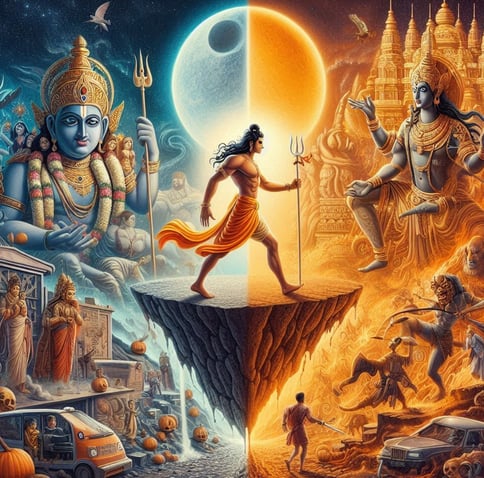The Mahabharata’s Bhagavad Gita: Duty vs. Desire in Modern Life
Discover the timeless wisdom of the Bhagavad Gita in our modern world. This in-depth blog explores the age-old battle between duty (dharma) and desire (kama) and how we can apply the Gita’s teachings to achieve work-life balance, ethical decision-making, mental resilience, and fulfillment. Learn how to balance ambition and responsibility, personal happiness, and moral duty in today’s fast-paced world. Read now to find clarity in your daily struggles! #BhagavadGita #DharmaVsDesire #ModernWisdom
WiserFool
Introduction
The Bhagavad Gita, an integral part of the Mahabharata, is one of the most profound spiritual and philosophical texts ever written. At its core, it presents the eternal struggle between duty (dharma) and desire (kama), a theme that resonates deeply in our fast-paced, modern world. In a society driven by ambition, material success, and personal fulfillment, the Gita’s lessons offer timeless wisdom on how to balance our responsibilities with our desires, leading to a fulfilling and meaningful life.
Understanding Duty (Dharma) and Desire (Kama)
Dharma: The Path of Responsibility
Dharma refers to the moral and ethical duties one must uphold in life. It varies depending on an individual’s role in society—whether as a student, professional, parent, or leader.
In the Bhagavad Gita, Arjuna faces a crisis on the battlefield of Kurukshetra, torn between his duty as a warrior and his personal emotions. Lord Krishna instructs him that upholding his dharma is of utmost importance, even when personal desires and emotions conflict with it.
Kama: The Drive of Personal Desires
Desire (kama) is a fundamental force in human life, encompassing ambition, emotions, and the pursuit of pleasure.
While desires are natural and can drive personal growth, unchecked desire can lead to greed, confusion, and moral dilemmas.
The Gita does not condemn desires but advises mastering them so they align with one’s higher purpose.
Applying the Gita’s Wisdom to Modern Life
Work-Life Balance
In today’s competitive world, professionals often struggle between career ambitions and personal well-being. The Gita teaches us to dedicate ourselves fully to our work without attachment to the results (Nishkama Karma – selfless action).
Practicing duty-driven work rather than being obsessed with outcomes can reduce stress and increase satisfaction.
Ethical Decision-Making
Modern leaders, politicians, and professionals frequently face ethical dilemmas. The Gita emphasizes righteousness (dharma) over self-interest, guiding individuals to make principled choices even when they are difficult.
Example: A corporate leader choosing integrity over profit or an individual standing up against corruption despite personal risk.
Desire vs. Duty in Relationships
Many modern relationships suffer because of conflicting personal desires and social responsibilities.
The Gita teaches detachment with love—fulfilling one’s role as a parent, spouse, or friend without excessive emotional dependence, leading to healthier relationships.
Mental Resilience & Overcoming Anxiety
Krishna teaches Arjuna to overcome doubt and fear by focusing on his duty rather than his anxieties.
This lesson is invaluable today, where anxiety over future outcomes cripples many individuals. Practicing mindfulness and focusing on action rather than results can lead to inner peace.
Consumerism vs. Contentment
In an age of materialism, where desires for wealth, status, and possessions drive many people, the Gita advises moderation and contentment.
True happiness, according to the Gita, comes not from external acquisitions but from inner fulfillment and alignment with one’s higher purpose.
Conclusion: Finding the Balance
The Bhagavad Gita does not advocate for the complete renunciation of desires nor blind adherence to duty. Instead, it offers a middle path, where one fulfills responsibilities with passion and dedication while maintaining emotional detachment from the results. This balance is key to achieving success, inner peace, and fulfillment in modern life.
As Arjuna learns from Krishna, we too must realize that our true power lies in controlling desires, embracing duty, and walking the path of righteousness. By integrating the wisdom of the Gita, we can navigate the complexities of life with clarity, purpose, and resilience.


